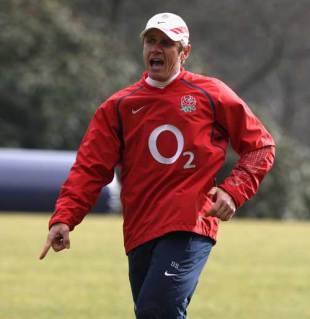|
Six Nations Championship
Smith points accusing finger at Wales
Scrum.com
February 23, 2009

Smith believes Wales got 'stuck into the referee' ahead of their clash earlier this month
© Getty Images
Enlarge
England coach Brian Smith has claimed referee Jonathan Kaplan was influenced by pressure from the Wales management ahead of their Six Nations clash in Cardiff. Wales beat their old rivals 23-15 at the Millennium Stadium earlier this month in a bruising encounter that saw Kaplan send England's Mike Tindall and Andy Goode to the sin-bin and award 14 penalties against the visitors. England's discipline has been under the spotlight since Martin Johnson took charge last year and they have now been shown eight yellow cards in three Tests. In the aftermath of their defeat to Wales, Johnson claimed his side were suffering from a "perception problem" amongst referees but Smith has gone one step further and pointed an accusing finger at Wales boss Warren Gatland and his coaches Shaun Edwards, Rob Howley and Neil Jenkins. "His (Kaplan's) whole demeanour through that match, the way he addressed our team in the changing room beforehand - he had clearly had heaps of pressure put on by Wales," said Smith. "The way our team was addressed prior to the Wales game took me a little bit by surprise. It was clear to me that Wales had done their job in terms of getting stuck into the referee. "Fair play to them for doing it. Teams are looking at every advantage they can get. What we are really trying to say to the refs is: 'Please judge us the same way you judge other teams and do not come into the game with a preconceived idea'." Smith directed that message directly at Craig Joubert, the South African who will take charge of England's Six Nations showdown with Ireland at Croke Park this coming Saturday. And it was backed up by captain Steve Borthwick, who admitted to being left bemused at the raft of penalties England conceded in the opening quarter against Wales. "I asked the referee: 'What is going on here?' He was seeing things I wasn't seeing and we needed to find out the interpretation," said Borthwick. "What we hope is that Joubert referees both sides equally, with the same interpretations for 80 minutes. Then we have got a level to be accountable to." England felt both Cardiff sin-binnings were questionable and they were frustrated Lee Byrne escaped a yellow card for taking out Delon Armitage in the air. "We're frustrated by those decisions," Smith added. "It was Mike Tindall's first infringement and he gets a yellow. It was touch and go whether he had actually won the football. "Goode had secured the ball, one of our players bumps into him, it looks like he is off his feet and he's gone. Our issue with the referees is that there is no doubt Wales played up on the fact (there is this perception about England) to Kaplan." However, England accept their discipline must improve if they are to stand any chance of emerging from Croke Park with a victory this weekend. Tindall's sin-binning had followed a fierce warning from referee Kaplan that England's next infringement would be punished after they had conceded five penalties in quick succession. England plan to bring an RFU referee into training this week in the hope of sharpening their practice at the breakdown. "We are mindful we have to be seen to be whiter than white," said Smith. "But we can't just back off at the breakdown. If we don't contest for the ball we could be blown away in the first half. We want the referee to make sure they keep Ireland honest in that area because we want to play rugby." The discipline issue first reared its head against Australia in November, when England gifted the Wallabies seven kickable penalties and fell to a 28-14 defeat. Against the All Blacks, England conceded 18 penalties and had four players sin-binned, with two more following in the opening Six Nations game win over Italy. "We don't practice cynicism or anything like that," added scrum coach Graham Rowntree. "The players are not refusing to listen. We need to sit down with them and get them to do things technically better at the breakdown." © Scrum.com
|
Live Sports
Communication error please reload the page.
-
Football
-
Cricket
-
Rugby
-
- Days
- Hrs
- Mins
- Secs
F1 - Abu Dhabi GP
Abu Dhabi Grand Prix December 11-131. Max Verstappen ()
2. Valtteri Bottas (Mercedes)
3. Lewis Hamilton (Mercedes)
4. Alexander Albon ()
5. Lando Norris ()
6. Carlos Sainz Jr ()
-
ESPNOtherLive >>
Darts - Premier League
Golf - Houston Open
Snooker - China Open
Tennis - Miami Open

